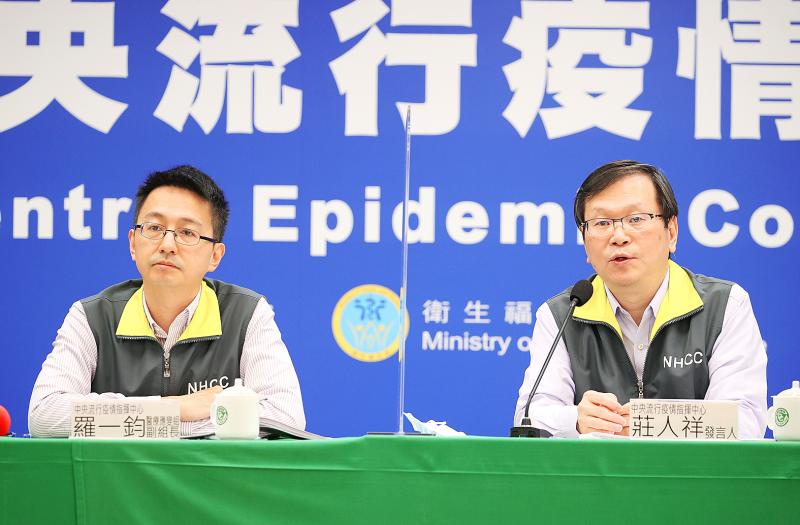Taiwan yesterday recorded one new imported case of COVID-19 involving an Indonesian who arrived in the nation last month to work on a fishing boat, the Central Epidemic Command Center said.
The Indonesian male, in his 20s, arrived in Taiwan on Dec. 31 with a negative test report, center spokesman Chuang Jen-hsiang (莊人祥) said at a news conference in Taipei.
He did not display any symptoms of the disease, Chuang said.

Photo: CNA
The man was tested again on Wednesday prior to his release from a 14-day mandatory quarantine and the result came back positive yesterday, he said.
Due to the high CT value of the test, which indicated the presence of only a small amount of viral genetic material and that the infection had likely run its course, the man was most likely infected a while ago in Indonesia, he added.
No contact tracing was required, as the man had not come in contact with anyone during his time in Taiwan, Chuang said.
Meanwhile, a new disease prevention regulation took effect yesterday whereby a home can only be used for quarantine if the person stays at the property on their own.
Previously people arriving in Taiwan could quarantine at a residence along with other people.
The tighter measure was introduced in response to the emergence of new more contagious variants of the virus that causes COVID-19, the center said, adding those found to have a breached the regulation would be fined NT$100,000 to NT$1 million (US$3,511 and US$35,112).
The center has also updated its disease prevention guidelines to provide more clarity on the rules ahead of the Lunar New Year, as Taiwanese living overseas in areas where COVID-19 is more prevalent prepare to return home for the holiday.
The latest update specifically addresses questions people might have about “self-health management,” a period of seven days during which arrivals to Taiwan must monitor their health after completing their mandatory 14-day quarantine.
People are required to wear a surgical mask at all times, take their temperature twice a day and avoid visits to public places, the center said.
They are also prohibited from partaking in group lunches or dinners, as such events require the removal of a mask while consuming food and beverages, it said.
They can visit supermarkets or convenience stories as long as they wear a mask throughout, but they should not visit crowded shopping malls where 1m social distancing is not possible, the center said.
Those who breach the regulations face up a fine of up to NT$300,000 under the Communicable Disease Control Act (傳染病防治法), it said.
Taiwan has recorded 843 cases of COVID-19, with 746 classified as imported. Of those cases, 741 have recovered, 95 remain in the hospital and seven have died, center data showed.

A preclearance service to facilitate entry for people traveling to select airports in Japan would be available from Thursday next week to Feb. 25 at Taiwan Taoyuan International Airport, Taoyuan International Airport Corp (TIAC) said on Tuesday. The service was first made available to Taiwanese travelers throughout the winter vacation of 2024 and during the Lunar New Year holiday. In addition to flights to the Japanese cities of Hakodate, Asahikawa, Akita, Sendai, Niigata, Okayama, Takamatsu, Kumamoto and Kagoshima, the service would be available to travelers to Kobe and Oita. The service can be accessed by passengers of 15 flight routes operated by

MORE FALL: An investigation into one of Xi’s key cronies, part of a broader ‘anti-corruption’ drive, indicates that he might have a deep distrust in the military, an expert said China’s latest military purge underscores systemic risks in its shift from collective leadership to sole rule under Chinese President Xi Jinping (習近平), and could disrupt its chain of command and military capabilities, a national security official said yesterday. If decisionmaking within the Chinese Communist Party has become “irrational” under one-man rule, the Taiwan Strait and the regional situation must be approached with extreme caution, given unforeseen risks, they added. The anonymous official made the remarks as China’s Central Military Commission Vice Chairman Zhang Youxia (張又俠) and Joint Staff Department Chief of Staff Liu Zhenli (劉振立) were reportedly being investigated for suspected “serious

Taiwanese and US defense groups are collaborating to introduce deployable, semi-autonomous manufacturing systems for drones and components in a boost to the nation’s supply chain resilience. Taiwan’s G-Tech Optroelectronics Corp subsidiary GTOC and the US’ Aerkomm Inc on Friday announced an agreement with fellow US-based Firestorm Lab to adopt the latter’s xCell, a technology featuring 3D printers fitted in 6.1m container units. The systems enable aerial platforms and parts to be produced in high volumes from dispersed nodes capable of rapid redeployment, to minimize the risk of enemy strikes and to meet field requirements, they said. Firestorm chief technology officer Ian Muceus said

Alain Robert, known as the "French Spider-Man," praised Alex Honnold as exceptionally well-prepared after the US climber completed a free solo ascent of Taipei 101 yesterday. Robert said Honnold's ascent of the 508m-tall skyscraper in just more than one-and-a-half hours without using safety ropes or equipment was a remarkable achievement. "This is my life," he said in an interview conducted in French, adding that he liked the feeling of being "on the edge of danger." The 63-year-old Frenchman climbed Taipei 101 using ropes in December 2004, taking about four hours to reach the top. On a one-to-10 scale of difficulty, Robert said Taipei 101